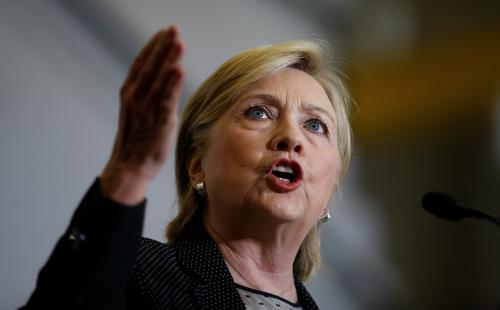My good friend and colleague, retired General John Allen, has come under some criticism ever since his speech at the Democratic National Convention two weeks ago in support of Hillary Clinton. Some have found his role too partisan or at least too blatantly political. As I wrote shortly after his speech, I strongly support General Allen.
Now, the highly esteemed retired General Barry McCaffrey has made a similar argument, also explaining in some detail why he strongly opposes a Trump presidency and thus winds up in strong support of Secretary Clinton. It is, after all, zero-sum time in this year’s race—one can construct fantastical scenarios about third-party candidates or late entries all you want, but our next president will almost surely be Trump or Clinton. So if you are strongly against the first, on matters of core principle and concern about our country’s national security, it is only logical that you should be strongly for the second. Many are somehow hoping this is not the case, but it is now reality, alas. I admire Allen and McCaffrey for recognizing as much, and hope others will join them. A career intelligence officer and former acting head of the CIA, Mike Morrell, has just done the same thing for similar reasons.
Beyond including the link to McCaffrey’s op-ed, I just wanted to rebut briefly some of the arguments that have been made to me in disagreeing with my earlier blog post or with Allen’s brilliant convention speech:
- “Hillary’s going to win anyway, so it wasn’t needed.” This kind of thinking—assuming victory before it happens—is not even sound for football coaching, much less something of such huge consequence as a national presidential election in the United States. One can never sit on a lead. And in fact, when Allen gave his speech, Hillary didn’t even have a lead in the polls.
- “It would have been better for General Allen to be more dispassionate.” Allen’s speech on Thursday night of the Democratic Convention was indeed rousing, and strong—partly because the room was noisy, and in fact many Sanders supporters had shouted down former Secretary of Defense Leon Panetta earlier that same week. But Trump had been loudly belittling and mocking Hillary’s national security record for so long, and others had been joining in the claim that she has somehow been reckless with our national security (including at least one former Army general as well as the former speaker of the House of Representatives), that a little bit of highly credible and passionate support for Clinton was needed. The stakes here warrant the full range of human emotion, after all.
“Allen ignored civilian control of the military.” He is out of uniform. The situation is not comparable to McClellan in the Civil War or MacArthur during World War II and Korea. Allen’s recent decision to engage the political debate reminds me more of Washington, Grant, and Eisenhower, with maybe a little bit of Colin Powell thrown in, than some firebrand general—or some active-duty military leader verging on insubordination.
“The stakes weren’t high enough to warrant such behavior.” Trump calls for carpet bombing, casual thinking on nuclear weapons, torturing prisoners, and abandoning allies we are treaty-bound to protect. I cannot imagine much higher stakes.
Allen, and now McCaffrey, have displayed a kind of wisdom, and moral courage, that some of their peers are counseling them against expressing in public. I think those peers are wrong. Allen and McCaffrey are serving their country in a crucial way at a perilous time. They have every right to do so—and in fact, we as a nation need them to do so.






Commentary
No ordinary times
August 8, 2016